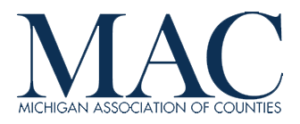NACo applauds county leaders’ help on federal aid bill
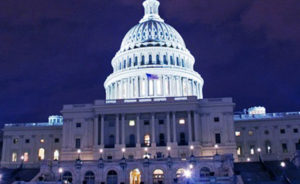
US Capitol
Much still must be clarified about the latest federal relief package awaiting House action before its full effects on counties are known, said officials with the National Association of Counties via a briefing call on Thursday, March 26.
NACo leaders, however, were pleased with the inclusion of the $150 billion Coronavirus Relief Fund included in the $2 trillion Senate-approved package that’s aimed at state, local and tribal governments.
Deborah Cox of NACo was able to state that:
- 45 percent of the $150 billion is eligible for direct payments to local units with populations above 500,000; and
- Such funds were meant for recent expenditures due to the public health emergency and unanticipated costs to local budgets that occurred on March 1 or after.
In Michigan, though, only four counties (Wayne, Oakland, Macomb and Kent) exceed the population threshold.
Cox and the NACo briefers said clarity was needed about aid to smaller counties and that there already were “100 different interpretations” of what the relief fund language actually meant.
Cox praised the calls from local county officials during the drafting process for helping to ensure counties would be specifically included in the relief fund.
Also critical is that under the economic stabilization sections of the bill, the U.S. Treasury can purchase debt from state and local units, while the Federal Reserve can participate in the secondary bond market for municipal debt, thereby reducing borrowing costs for counties.
Other key elements to the “CARES” Act identified in the call:
- $1.32 billion is allotted to community health centers for COVID response – “a definite win for counties,” NACo said
- Previously planned cuts to hospitals serving the uninsured and underinsured were pushed back to Nov. 30
- $1 billion for agencies for aging to help them deliver meals, provide home-based services, support care-givers and provide equipment nursing homes to protect residents
- $400 million for election assistance in the 2020 cycle
- $56 million for airports in the Essential Air Service program
- $5 billion for CDBG
- $45 billion for FEMA disaster relief fund
NACo’s comprehensive analysis of the bill can be found here. As for eventual timing of the funds, the House passed the bill on Friday afternoon, President Trump is expected to sign it later today.
Damage from rising water levels will mount, state warns
 The Michigan Department of Environment, Great Lakes and Energy (EGLE) hosted an hour-long seminar Thursday evening to highlight the vulnerability of our natural resources and infrastructure due to record high water levels across Michigan and the Great Lakes.
The Michigan Department of Environment, Great Lakes and Energy (EGLE) hosted an hour-long seminar Thursday evening to highlight the vulnerability of our natural resources and infrastructure due to record high water levels across Michigan and the Great Lakes.
Presentations by the Army Corp of Engineers and EGLE provided viewers with charts and graphs reporting record levels during 2019 and 2020 for all of the Great Lakes, and the current trajectory for water levels in the coming spring and summer months. The trend is calling for significantly higher water levels and the potential for greater and more costly damage to Michigan’s shorelines, farmland, parks, roads and other critical infrastructure.
The Michigan Department of Transportation estimates it has spent more than $5 million mitigating damage and anticipates that number to reach near $100 million before it’s all over. The Michigan Department of Agriculture reported that more than million acres of farmland could not be planted due to flooding last year, and its projections for the 2020 growing season are just as stark.
What is most concerning is damages inflicted on municipal infrastructure. These high water levels have affected stormwater systems and sewer systems and caused discharges from combined stormwater and sewer systems. EGLE sent a letter to each entity in possession of a National Pollutant Discharge Elimination System permit asking that they submit a vulnerability analysis to minimize the impact this anticipated rise in water levels will have on existing infrastructure.
The city of Detroit is spending $2 million on temporary dams to help prevent an overload of their combined stormwater and sewer systems. Work is under way to map the potential effects of a one-foot rise in Great Lakes levels, analyze where all of that water is going to go and figure out how best to notify residents of the potential for flooding.
A copy of the presentations will soon be up on EGLS website.
For more information on this issue, contact Deena Bosworth at boswort@micounties.org.
Urge your county to reply to census today
![]() By now, you’ve probably received the 2020 Census in your mailbox. While national attention is properly focused on COVID-19, it is important to encourage your county residents to count themselves. The census determines congressional representation, as well as federal funding for public health and disease prevention, Medicaid and Medicare, health care centers statewide and other essential services.
By now, you’ve probably received the 2020 Census in your mailbox. While national attention is properly focused on COVID-19, it is important to encourage your county residents to count themselves. The census determines congressional representation, as well as federal funding for public health and disease prevention, Medicaid and Medicare, health care centers statewide and other essential services.
So far, Michigan ranks sixth in the country for census responses at 30.6 percent, compared to 26.2 percent nationwide (you can find an interactive map that includes all 50 states’ response rates here.) In 2010, Michigan had a response rate of 68 percent and our goal this year is 82 percent.
To date, more than 25 percent of census responses in Michigan have been done online, an option available for the first time this year. It is important to underscore that the census only has 9 questions and shouldn’t take more than 10 minutes to fill out to completion.
Census takers were scheduled to begin canvassing households that hadn’t yet responded in early April, but COVID-19 has, of course, disrupted that timeline. In the interim, please urge your constituents to fill out the census at their earliest convenience. This can be done online at www.my2020census.gov, over the phone at 844-330-2020 or through the physical form that comes in the mail.
The COVID-19 pandemic is a reminder why it’s never been more critical that all Michigan residents fill out their census form in order to get our fair share of funding for emergency services, police and fire funding, senior programs and more. Help us keep Michigan near the best in the nation!
For more information on this issue, contact Michael Ruddock at ruddock@micounties.org.
Maintenance is essential activity; counties must facilitate utility work, etc.
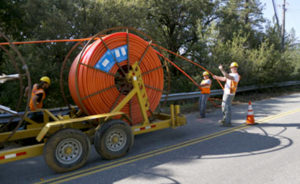 MAC is issuing another advisory to all counties regarding your code and permit operations that affect businesses such as utilities doing maintenance work.
MAC is issuing another advisory to all counties regarding your code and permit operations that affect businesses such as utilities doing maintenance work.
Here is what the Governor’s Office says on this issue under her EO:
“Q: Is construction allowed under the executive order?
“A: Some limited forms of construction are permissible, including construction to maintain and improve essential public works like roads, bridges, the telecommunications infrastructure, and public health infrastructure. Construction workers may also undertake such projects as necessary to maintain and improve the safety, sanitation, and essential operations of residences. In addition, businesses may designate construction firms to provide necessary support to the work of the businesses’ critical infrastructure workers. All construction work that is carried out while the order is in effect must be done in accordance with the mitigation measures required under section 5(c) of the order.”
We have received reports of county offices telling callers that they are blocked by the EO from operating the normal coordination process on maintenance work. One example: “Point of call (to MAC) is to discuss some issues the telecom and energy issues are having as local units of government are limiting workforce hours and availability. This has impacted critical projects and emergency repairs around the state when permits are sought or 811 staking is required.”
Please review with your teams to ensure operational/staff support to these activities.
If you have questions on this, contact Deena Bosworth at bosworth@micounties.org.
County leaders, look for survey info in email, mailboxes
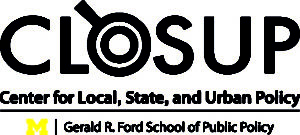 With the coronavirus (COVID-19) outbreak placing tremendous stress on so many of our communities, we’re hoping you might find time to share your experiences through the upcoming round of the Michigan Public Policy Survey (MPPS) program is coming soon to your mailbox.
With the coronavirus (COVID-19) outbreak placing tremendous stress on so many of our communities, we’re hoping you might find time to share your experiences through the upcoming round of the Michigan Public Policy Survey (MPPS) program is coming soon to your mailbox.
The MPPS is an annual statewide survey of local government officials conducted by the University of Michigan in collaboration with the Michigan Townships Association (MTA), Michigan Municipal League (MML), and Michigan Association of Counties (MAC).
On March 30, you’ll receive an email link to the new MPPS questionnaire, which asks about the public health and economic challenges your county may be facing because of COVID-19. It also continues the annual tracking of counties’ fiscal health.
The U-M survey team plans to quickly share responses to the COVID-19 questions with other leaders to help the state respond to the crisis, all while carefully protecting your anonymity and confidentiality. Your participation is crucial to the success of the MPPS program.
If you have questions about this research study, you can contact Dr. Debra Horner, Center for Local, State, and Urban Policy, University of Michigan, 5309 Weill Hall, 735 S. State St., Ann Arbor, MI 48109, 734-647-4091, closup-mpps@umich.edu.
Please keep an eye out for your email invitation to take the survey next week. Thank you so much for supporting this effort.
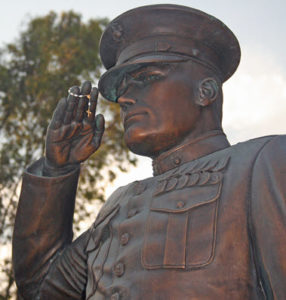 State adjutant general details crisis response
State adjutant general details crisis response
DTE outlines actions taken in coronavirus crisis
 DTE has taken the following actions to aid customers and keep employees safe during this challenging, unprecedented time:
DTE has taken the following actions to aid customers and keep employees safe during this challenging, unprecedented time:
- DTE has all employees who can work remotely doing so, and we’ve kept those essential employees needed at facilities in their roles to maintain both gas and electric service for our customers
- We are also suspending shutoffs and extend senior programs in response to the coronavirus through April 30
- DTE has suspended all non-essential work as of March 23 – news release with details below
- Updates for customers, including Q&A, can be found by visiting dteenergy.com/covid19.

 With coronavirus confirmed in Michigan, MAC has announced several steps to respond to the coronavirus situation in the interests of minimizing risk to members and staff alike.
With coronavirus confirmed in Michigan, MAC has announced several steps to respond to the coronavirus situation in the interests of minimizing risk to members and staff alike. An additional $312.3 million in state spending was passed by the Legislature this week and sent to the governor’s desk for signature.
An additional $312.3 million in state spending was passed by the Legislature this week and sent to the governor’s desk for signature. A package of bills that would give more local control to the Upper Peninsula in how they regulate hunting and fishing has been introduced in the House. House Bills 5592-5594 and Joint Resolution Q would create the Upper Peninsula Natural Resources Commission and grant authority to the commission on decision-making concerning the UP’s vast hunting and fishing landscape.
A package of bills that would give more local control to the Upper Peninsula in how they regulate hunting and fishing has been introduced in the House. House Bills 5592-5594 and Joint Resolution Q would create the Upper Peninsula Natural Resources Commission and grant authority to the commission on decision-making concerning the UP’s vast hunting and fishing landscape.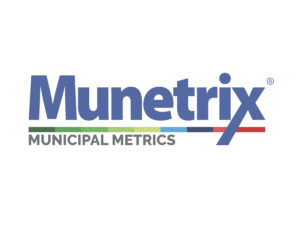 The Michigan Association of Counties, in partnership with Munetrix, a Michigan firm specializing in government data, has developed a new salary survey database and tool. The first phase of this tool will focus solely on sheriff deputies and their pay and benefits. This tool is designed in response to our members voicing their concern about the increasing cost of salary surveys. This our first step in providing a more robust salary survey tool that covers all departments and will be consistently updated.
The Michigan Association of Counties, in partnership with Munetrix, a Michigan firm specializing in government data, has developed a new salary survey database and tool. The first phase of this tool will focus solely on sheriff deputies and their pay and benefits. This tool is designed in response to our members voicing their concern about the increasing cost of salary surveys. This our first step in providing a more robust salary survey tool that covers all departments and will be consistently updated. Voters give broad approval to county millage requests
Voters give broad approval to county millage requests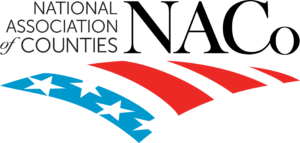 National news from NACo
National news from NACo
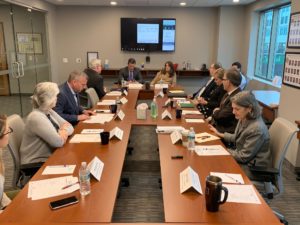 MAC Board President Veronica Klinefelt and Executive Director Stephan Currie met this week with leaders of groups for Michigan clerks, treasurers and registers of deeds to discuss legislative priorities for 2020.
MAC Board President Veronica Klinefelt and Executive Director Stephan Currie met this week with leaders of groups for Michigan clerks, treasurers and registers of deeds to discuss legislative priorities for 2020.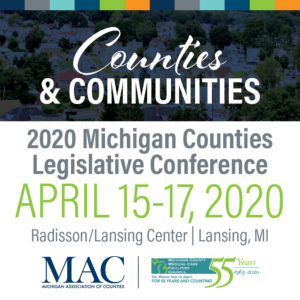 The
The  Training sessions designed to help county leaders on capital project planning and general financial oversight will begin March 4 and continue through the summer.
Training sessions designed to help county leaders on capital project planning and general financial oversight will begin March 4 and continue through the summer. The State Land Bank Authority has launched a second round of
The State Land Bank Authority has launched a second round of  The Michigan Opioids Task Force and Michigan Department of Health and Human Services (MDHHS) are hosting a town hall Thursday, March 12, 5:30-6:30 p.m., at the Sterling Heights Community Center, 40250 Dodge Park Road.
The Michigan Opioids Task Force and Michigan Department of Health and Human Services (MDHHS) are hosting a town hall Thursday, March 12, 5:30-6:30 p.m., at the Sterling Heights Community Center, 40250 Dodge Park Road.  The Michigan Department of Agriculture and Rural Development (MDARD) is issuing $127,240 to 23 recipients of the 2020 Animal Welfare Fund grants. The grants help support the spaying and neutering of shelter dogs and cats to help them be more adoptable. Grants also help support many anti-cruelty and proper care programs and training around the state. Registered shelters also can receive assistance through the grant program for the unrecovered costs of care for animals involved in legal investigations.
The Michigan Department of Agriculture and Rural Development (MDARD) is issuing $127,240 to 23 recipients of the 2020 Animal Welfare Fund grants. The grants help support the spaying and neutering of shelter dogs and cats to help them be more adoptable. Grants also help support many anti-cruelty and proper care programs and training around the state. Registered shelters also can receive assistance through the grant program for the unrecovered costs of care for animals involved in legal investigations. On Jan. 1, 2021, counties must have a plan and changes in place to comply with the law on E911 (Enhanced 911 services).
On Jan. 1, 2021, counties must have a plan and changes in place to comply with the law on E911 (Enhanced 911 services).